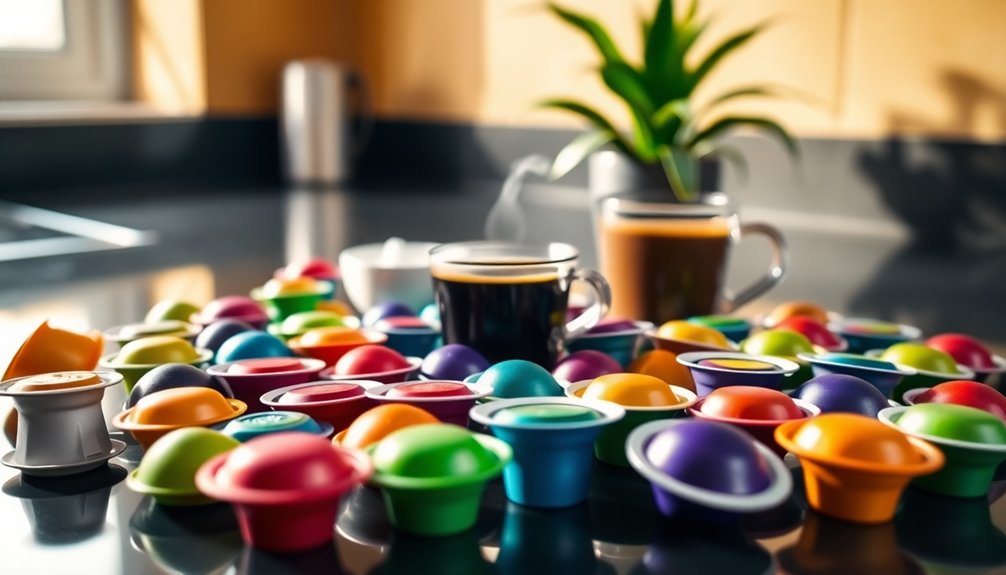Single-serve coffee pods can expose you to several health risks, like chemical contaminants from BPA and aluminum, which may harm your hormonal and neurological health. Caffeine overconsumption is another concern, potentially leading to jitters and insomnia. Additionally, stale coffee and mold growth in machines can affect flavor and safety. Waste from non-recyclable pods adds to environmental pollutants. To mitigate these issues, consider reusable pods, explore traditional brewing methods, and monitor your caffeine intake. Want to know more about healthier alternatives and how to enjoy better coffee? There’s a lot you can explore to enhance your coffee experience. By understanding the health risks of coffee pods, you can make more informed choices about your daily brew. Opting for freshly ground coffee from sustainable sources not only enhances flavor but also reduces potential exposure to harmful substances. Furthermore, educating yourself on the brewing process can lead to a richer and more enjoyable cup while significantly diminishing any associated health concerns.
Key Takeaways
- Single-serve coffee pods may leach BPA and phthalates, increasing health risks; opt for reusable pods made from stainless steel or BPA-free materials.
- Caffeine overconsumption from pods can lead to insomnia and jitters; monitor intake and alternate with decaffeinated options.
- The production of coffee pods contributes to environmental pollution; choose compostable or reusable pods to reduce waste.
- Rapid brewing in pods limits flavor and nutrient extraction; explore traditional brewing methods for richer taste and higher antioxidant retention.
- Stale pre-packaged coffee in pods diminishes quality; invest in freshly ground coffee for enhanced flavor and aroma.
Chemical Contaminants in Pods

When you brew coffee using single-serve pods, you might unknowingly expose yourself to harmful chemical contaminants.
Many coffee pods, especially K-Cups, are made from #7 plastic, which may contain BPA. This chemical can leach into your coffee under high temperatures and pressures, posing potential health risks.
Additionally, phthalates, used to enhance plastic flexibility, may also leach into your brew, raising concerns about reproductive health.
The combination of plastic and aluminum complicates recycling efforts, leading to increased environmental impacts.
To mitigate these risks, consider opting for BPA-free plastic pods or switching to alternative brewing methods. Using air purifiers with HEPA filters can help reduce indoor pollutants, supporting a healthier living environment as you enjoy your coffee.
Being aware of chemical leaching can help you make informed choices for both your health and the planet.
BPA and Hormonal Disruption

While enjoying your coffee, you mightn't realize that the single-serve pods you're using could be affecting your hormonal health.
Many of these pods are made from #7 plastic, which may contain bisphenol A (BPA), a chemical linked to hormonal disruption and various health concerns.
Studies show that BPA can mimic estrogen, potentially leading to reproductive issues and hormonal imbalances.
When heated, chemical leaching from these pods into your coffee raises further concerns about your long-term health.
To mitigate these risks, consider switching to reusable coffee pods made from stainless steel or BPA-free materials.
This simple change can greatly reduce your exposure to harmful chemicals and help protect your hormonal health.
Aluminum Exposure Risks

After considering the potential impact of BPA on hormonal health, it's important to also recognize the risks associated with aluminum exposure from single-serve coffee pods.
During the brewing process, aluminum can leach into your coffee, especially under high temperature and pressure. Long-term aluminum exposure has been linked to serious health implications, including neurological disorders like Alzheimer's disease.
To mitigate these risks, consider the following options:
- Opt for coffee pods made from alternative materials.
- Use reusable pods made from stainless steel or BPA-free plastics.
- Avoid regular consumption of aluminum-tainted coffee.
- Guarantee proper recycling practices to minimize environmental contamination.
Caffeine Overconsumption
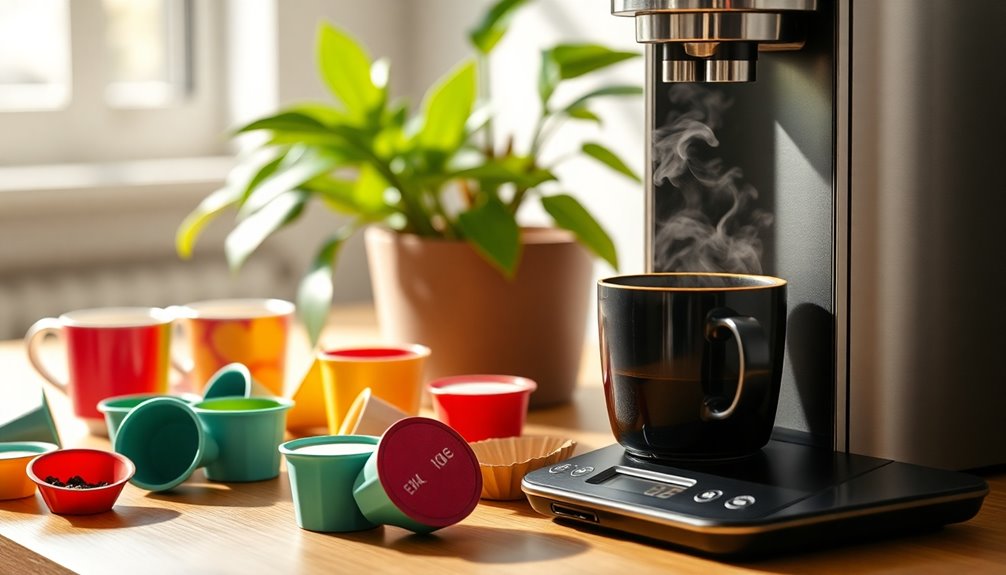
Caffeine overconsumption can sneak up on you, especially with the convenience of single-serve coffee pods. Each pod contains 75-100 mg of caffeine, and if you're not careful, your caffeine intake can exceed the FDA's recommended 400 mg per day. Regularly consuming excessive caffeine can lead to health issues like insomnia, jitters, and digestive problems. It's essential to monitor your intake, especially if you're sensitive to caffeine. To keep things in check, consider alternating between regular and decaffeinated pods or limiting the number of pods you use daily.
| Number of Pods | Caffeine Range (mg) | Total Daily Caffeine (mg) |
|---|---|---|
| 1 | 75-100 | 75-100 |
| 2 | 150-200 | 150-200 |
| 3 | 225-300 | 225-300 |
| 4 | 300-400 | 300-400 |
| 5 | 375-500 | 375-500 |
Mold Growth in Machines
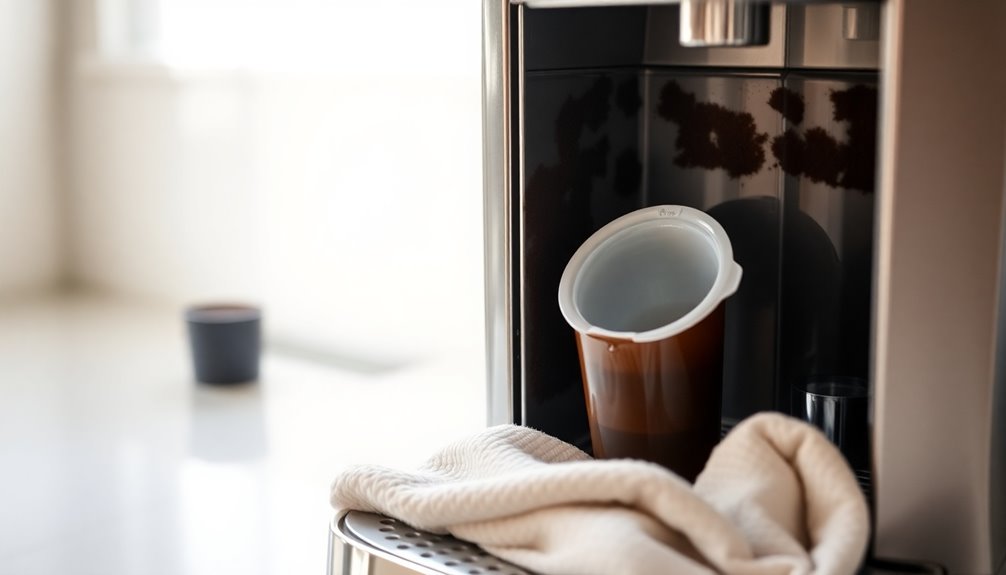
If you don't clean your single-serve coffee machine regularly, you could be brewing more than just coffee; you might be introducing harmful mold and bacteria into your cup.
These machines can harbor mold, particularly in damp areas like the water reservoir. To maintain hygiene and prevent health risks, follow these cleaning tips:
- Clean the water reservoir monthly with a vinegar-water mixture.
- Descale your machine regularly to remove buildup.
- Empty any standing water after each use to discourage mold growth.
- Wipe down surfaces and components to eliminate bacteria.
Digestive Issues From Pods

Neglecting regular cleaning of your single-serve coffee machine can lead to mold growth, but there's more to contemplate than just hygiene.
Using plastic pods, especially those containing BPA, can raise concerns about chemical leaching during brewing. This may contribute to digestive issues, like acid reflux and stomach upset, particularly for sensitive individuals.
Additionally, the high caffeine content in single-serve coffee can exacerbate these problems, so monitoring your intake is vital.
The rapid brewing process might also limit the extraction of beneficial compounds, leading to a less satisfying cup and potential gastrointestinal discomfort.
To avoid these issues, consider reducing your pod use or switching to alternative brewing methods for a healthier caffeine fix. Furthermore, it's essential to be aware of financial considerations for elderly care when evaluating the overall impact of consumption habits on health.
Environmental Pollutants
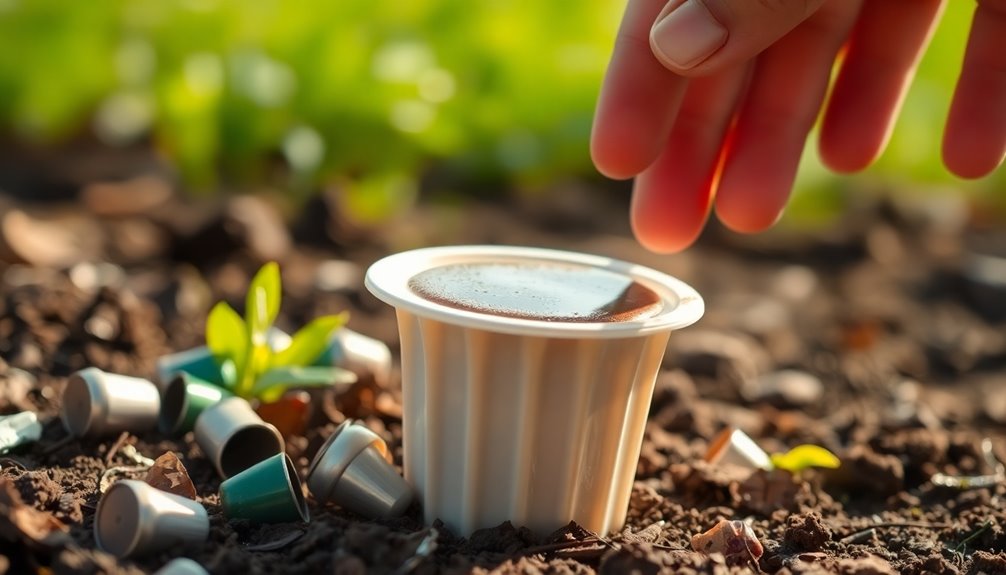
While enjoying your single-serve coffee, you may not realize the environmental impact of those convenient pods. The production and disposal of coffee pods, primarily made from plastic, contribute greatly to environmental pollutants.
Here are four key concerns:
- Harmful Chemicals: Coffee brewed from plastic pods can leach substances like BPA and phthalates, raising health effects related to hormone disruption.
- Waste Generation: Approximately 39,000 coffee pods are generated every minute, with many ending up in landfills.
- Recycling Challenges: The complex materials in K-Cups complicate recycling efforts, increasing waste and carbon footprints.
- Sustainable Alternatives: Switching to compostable coffee pods can help mitigate these environmental impacts, promoting more sustainable consumption practices. Additionally, improving indoor air quality through the use of air purifiers can further enhance your coffee enjoyment by reducing pollutants in your environment.
Plastic Waste Concerns
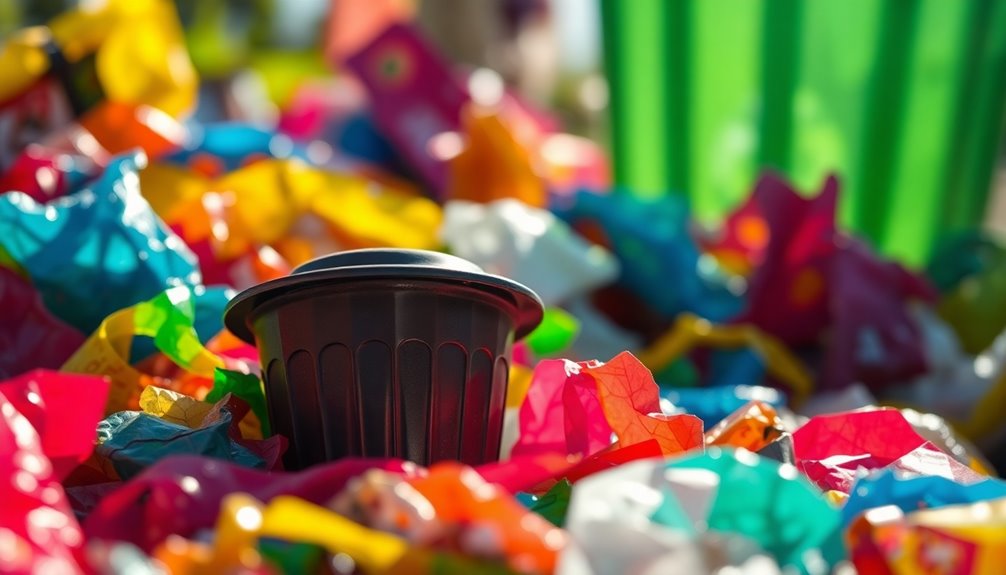
When you use single-serve coffee pods, you're contributing to a growing plastic waste problem.
With billions of these pods ending up in landfills each year, their complex materials make recycling a real challenge.
It's essential to contemplate more sustainable options to lessen their environmental impact.
Environmental Impact of Pods
Every minute, approximately 39,000 single-serve coffee pods are produced worldwide, contributing to a staggering plastic waste crisis.
These single-use pods, primarily made from #7 plastic, take up to 500 years to decompose. The environmental impact is profound, with billions ending up in landfills annually.
To address this issue, consider the following:
- Choose reusable coffee pods to minimize plastic waste.
- Opt for biodegradable options that break down faster.
- Support brands focusing on sustainable alternatives.
- Advocate for improved recycling processes for mixed materials.
Recycling Challenges and Solutions
The environmental impact of single-serve coffee pods extends beyond their production; recycling these pods presents significant challenges. Keurigs K-Cups are made from #7 plastic, often non-recyclable in many areas, leading to billions of pods in landfills annually. Their mixed materials complicate recycling efforts, and about 39,000 coffee pods are produced globally every minute, worsening plastic waste concerns.
| Challenge | Description | Potential Solutions |
|---|---|---|
| Non-recyclable Plastic | Many regions can't recycle #7 plastic. | Explore alternative materials. |
| Mixed Materials | The combination of plastics, aluminum, and coffee. | Create easier-to-recycle pod designs. |
| Size Issues | Small pods often fall through sorting grates. | Implement specialized sorting systems. |
Keurig's partnership with TerraCycle aims to improve recycling programs, addressing these pressing environmental issues. Additionally, addressing waste management strategies can help mitigate the overall impact of coffee pod disposal.
Lack of Nutritional Value
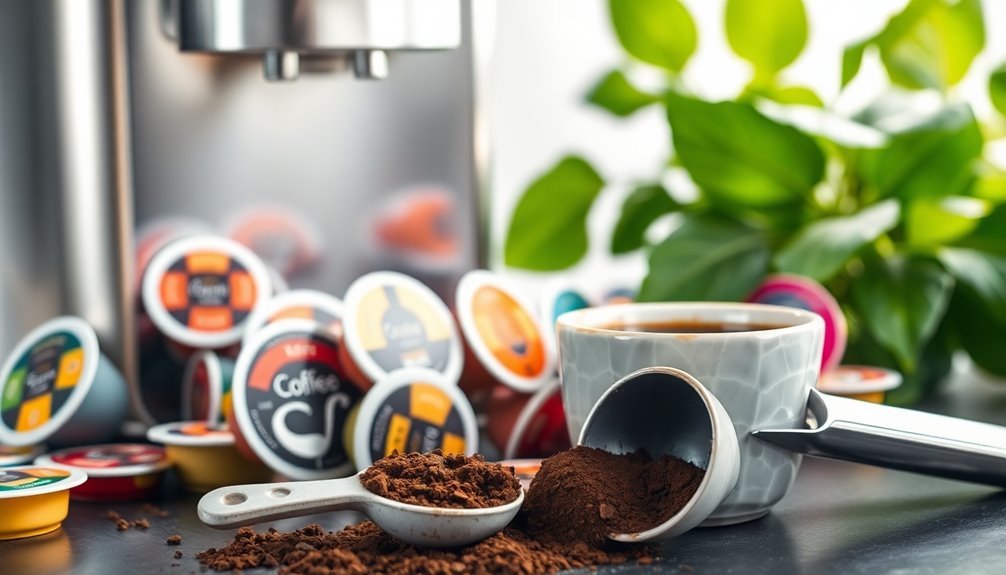
When you choose single-serve coffee pods, you might be sacrificing nutritional value for convenience.
The rapid brewing process limits the extraction of antioxidants like chlorogenic acid, which are essential for your health.
Plus, the pre-packaged nature of these pods can lead to stale coffee, further diminishing their nutrient content.
Limited Antioxidant Extraction
Although single-serve coffee pods offer convenience, they often fall short in delivering the full range of antioxidants that traditional brewing methods provide.
The rapid brewing process leads to limited antioxidant extraction, resulting in a less rich flavor and reduced health benefits.
Here are four key points to contemplate:
- Traditional brewing methods, like French press or pour-over, preserve more antioxidants.
- Coffee pods typically yield lower levels of chlorogenic acid, a beneficial antioxidant.
- The quick brewing time sacrifices the complex profile found in brewed coffee.
- Reduced antioxidant levels in pod-brewed coffee may mean fewer anti-inflammatory benefits.
To enjoy the health benefits of coffee, think about switching to traditional brewing methods that maximize antioxidant extraction.
Consistency in Flavor Quality
While single-serve coffee pods offer convenience, they often deliver a lack of consistency in flavor quality that can leave coffee lovers disappointed.
The rapid brewing process used with coffee pods limits the extraction of beneficial compounds, resulting in a less rich and complex flavor profile. Unlike traditional methods like pour-over or French press, which preserve the quality of the coffee, coffee brewed from pods tends to have a uniform taste that lacks depth.
Additionally, pre-measured ground coffee in K-Cups may lose freshness and aroma, further detracting from your experience.
If you value flavor quality, consider investing time in traditional brewing methods to enhance your coffee journey and enjoy a more satisfying cup.
Nutrient Depletion Risks
Despite the convenience of single-serve coffee pods, they often come with significant nutrient depletion risks that can impact your overall coffee experience. The rapid brewing process limits the extraction of beneficial compounds, leading to less flavorful coffee.
Here are four key concerns:
- Lower Antioxidants: K-Cups may contain fewer antioxidants like chlorogenic acid compared to traditionally brewed coffee.
- Compromised Nutritional Value: Pre-measured coffee grounds restrict ideal brewing time and temperature.
- Quality Over Convenience: Relying on coffee pods can result in neglecting the health benefits of whole bean brewing.
- Environmental Impact: Single-use pods contribute to waste, raising health and environmental concerns.
Additionally, research suggests that dreams of deceased loved ones can aid in emotional healing, highlighting the importance of maintaining mental well-being while enjoying your coffee ritual.
Opting for ground coffee can enhance both flavor and health benefits, making your brew more enjoyable and nutritious.
Alternatives to Single-Serve Pods
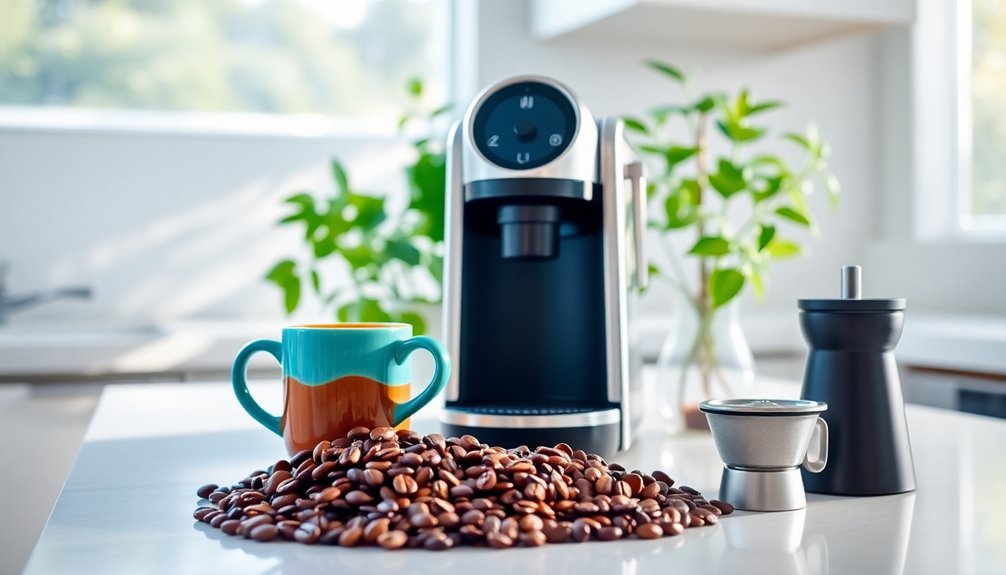
If you're looking for healthier and more sustainable alternatives to single-serve coffee pods, several options can enhance your coffee experience.
Consider using reusable stainless steel coffee pods; they markedly reduce exposure to harmful chemicals and waste.
Biodegradable coffee pods made from paper or plant-based plastics decompose faster than traditional K-Cups, making them an eco-friendly choice.
Pour-over brewing methods utilize compostable filters, allowing better flavor extraction while being environmentally responsible.
If you prefer a gentler option for your digestive health, cold brew coffee offers a smoother flavor profile and lower acidity.
Many brands also produce compostable coffee pods, providing a convenient brewing option without the negative impacts of single-use plastics.
Additionally, opting for alternatives that are lower in saturated fat can contribute to better heart health while enjoying your coffee routine.
Embrace these alternatives for a healthier coffee routine!
Frequently Asked Questions
What Is the Health Risk of Coffee Pods?
When you use coffee pods, you might be unaware of potential health risks.
Some pods contain materials that could release harmful chemicals into your drink, especially when brewed at high temperatures. This exposure might affect your hormones and reproductive health.
Additionally, the quick brewing process may lead to a less flavorful cup, missing out on beneficial antioxidants.
It's worth considering alternatives to guarantee your coffee experience is both safe and enjoyable.
What Are the Disadvantages of Single Serving Coffee Pods or Discs?
Single-serve coffee pods have several disadvantages. They often result in a less rich flavor due to lower extraction of antioxidants compared to traditional brewing methods.
You might also find their environmental impact concerning, as billions end up in landfills, taking centuries to decompose. Additionally, recycling them can be tricky, given their mixed materials.
This can lead to a larger carbon footprint, which isn't good for our planet's health.
What Is the Problem With Coffee Pods?
Did you know that over 29 billion single-serve coffee pods are used annually in the U.S. alone?
The problem with coffee pods lies in their convenience, which comes at a cost. They generate massive amounts of waste, as many aren't recyclable.
Plus, the brewing process can limit the extraction of beneficial compounds, leaving you with a less nutritious cup of coffee.
It's crucial to reflect on these downsides when choosing your morning brew.
Does the Aluminium From Coffee Pods Leach Into the Coffee?
Yes, aluminum from coffee pods can leach into your coffee, especially when brewed at high temperatures.
The acidic nature of coffee increases the likelihood of this leaching. If you're a frequent coffee drinker, this could raise concerns about aluminum exposure.
It's important to be aware of what's in your coffee. Consider switching to pods made from alternative materials or reusable options to reduce any potential risk of aluminum in your daily brew.
Conclusion
In the world of single-serve coffee pods, the convenience can sometimes mask hidden perils. Just like a beautiful flower may hide thorns, these pods can pose health risks if you're not careful. By being aware of chemical contaminants, waste, and the potential for overconsumption, you can sip your coffee with peace of mind. Consider alternatives that bloom with benefits, ensuring your daily brew doesn't come at the expense of your health or the planet.
